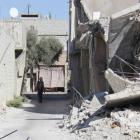US President Barack Obama and his allies sought to convince cautious lawmakers and the public of the need to strike Syria although officials have conceded they lacked conclusive evidence that President Bashar al-Assad ordered his forces to use chemical weapons against civilians.
US and allied intelligence agencies' have made a preliminary assessment that chemical weapons were used by Syrian forces in an attack near Damascus this week, likely with high-level approval from the government of President Bashar al-Assad, according to American and European security sources.
Syria has agreed to let the United Nations inspect the site of a suspected chemical weapons attack but a US official said any such offer would be "too late to be credible" and there was little doubt the government was to blame.
France says it expects the UN Security Council to agree on a resolution to enforce a chemical weapons deal with Syria and appeared to give up on its previous calls to have a resolution threatening force against President Bashar al-Assad.
The US Senate Foreign Relations Committee has approved a resolution authorising a limited US military intervention in Syria, setting the stage for a debate in the full Senate next week on the use of military force.
UN chemical investigators have confirmed the use of sarin nerve agent in an August 21 poison gas attack outside the Syrian capital in a long-awaited report that confirmed the West's suspicions but was not intended to assign blame.
Russia's Deputy Foreign Minister Sergei Ryabkov says an initial UN Security Council resolution supporting a deal for Syria to scrap its chemical arms should be limited to that purpose, suggesting Moscow would oppose any threat of force.
The United States could look beyond the UN Security Council in any strike on Syria, writes Louis Charbonneau, of Reuters, from New York.
The United States says it is unable to conclusively say that chemical weapons were used in an alleged deadly gas attack near Damascus, and US President Barack Obama has directed US intelligence agencies to urgently help verify allegations.
Syrian President Bashar al-Assad's forces have launched a major offensive against rebels in Homs, a centre of the two-year-old uprising, in their latest drive to secure an axis connecting Damascus to the Mediterranean.
Forces loyal to Syrian President Bashar al-Assad have killed at least 13 members of a family in the Sunni Muslim village of Baida, in what activists said was the second massacre there.
Neighbouring Iraq is warning that Syria's civil war is tearing the Middle East apart, and Lebanon's president has urged his country's Hezbollah movement to pull its fighters out of the conflict.
US President Barack Obama is deciding whether to take new action to help Syria's rebels, the White House said on Thursday, while President Bashar al-Assad's surging forces and their Lebanese Hezbollah allies turned their guns on the north.
The United Nations has warned half of all Syrians will need humanitarian aid by the end of 2013 and launched what it said was the biggest emergency appeal in history to cope with the civil war crisis.
Apart from a bullet-scarred clock tower that somehow survived the battle, few buildings still stood in the ruined streets of the former rebel stronghold of Qusair, seized hours earlier by Syrian President Bashar al-Assad's forces.
The US State Department has called on Lebanon's Hezbollah militia to withdraw its fighters from Syria immediately, saying their involvement on the side of President Bashar al-Assad signalled a dangerous broadening of the war.
Syrian rebels under siege near the Lebanese border have pleaded for help against government troops and their Hezbollah allies as a confident President Bashar al-Assad spoke of having new Russian missiles.
Syria's opposition resumed talks aimed at closing their fractious ranks, as government forces launched a fierce onslaught on a rebel-held border town to try to gain the upper hand in the civil war.
Lebanese Hezbollah militants attacked a Syrian rebel-held town alongside Syrian troops and Israel threatened more attacks on Syria to rein the militia in, highlighting the risks of a wider regional conflict if planned peace talks fail.
Lebanese troops blocked streets in Beirut with tanks and barbed wire for several hours after the killing of a protester outside the Iranian embassy raised factional tensions already inflamed by the war in Syria.



